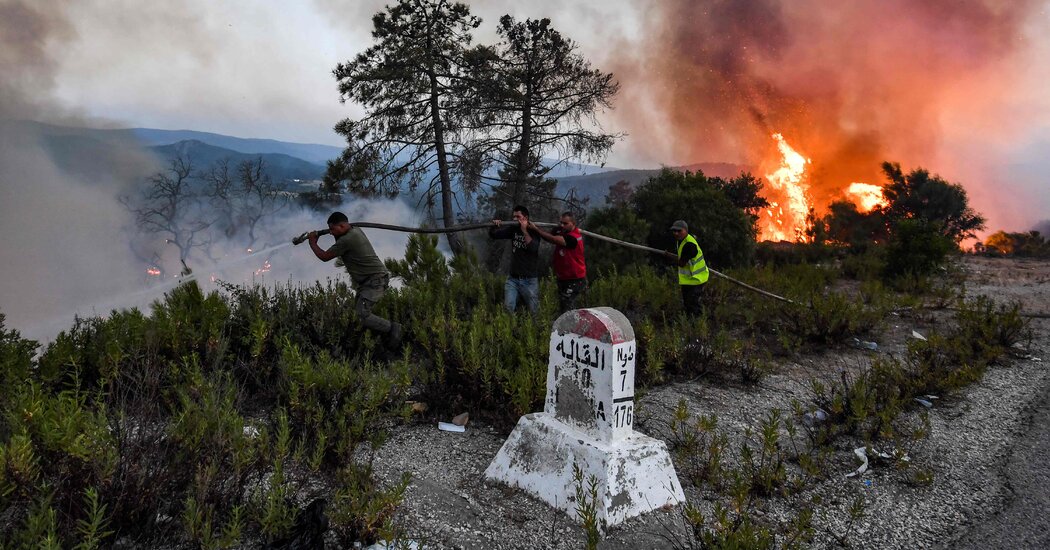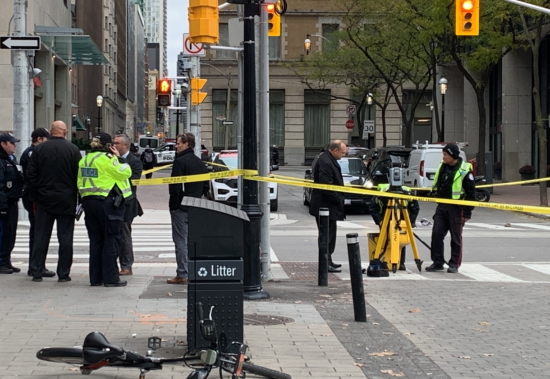
Wildfires devouring swaths of Algeria’s Mediterranean coast have killed 34 people over two days, the Algerian authorities said on Tuesday, as an extreme heat wave sears North Africa, Southern Europe and the sea between them.
The dead include 10 soldiers who were aiding rescue efforts across Algeria’s forested Kabylia region, the Algerian Interior Ministry said. Another 16 people died in the fires in the village of Ath Oussalah, according to Berber TV, a local broadcaster.
One villager whom the station captured on camera had lost her daughter. “I wish her home burned down but she was still alive,” the woman told onlookers in the village.
The fires forced more than 1,500 households to evacuate and caused at least 1,700 homes to lose power, state-run radio reported. Plumes of smoke rose from at least 16 cities east of the capital, Algiers, including Bejaia, Jijel and Tizi Ouzou. The government, which had deployed 8,000 emergency responders, said on Tuesday that it had contained 80 percent of the 97 fires, but that 13 remained out of control.
The blazes had also spread to neighboring Tunisia, which is suffering through similarly intense heat.
For days now, countries around the world have been trapped in a cycle of nightmarish heat waves as the effects of climate change are exacerbated by El Niño, a cyclical weather pattern that originates in the Pacific. The same parched conditions helped ignite wildfires in Greece in recent days, forcing mass evacuations of residents and tourists there.
In some parts of Algeria, temperatures have reached as high as 135 degrees Fahrenheit, or 57 Celsius; in Tunisia, they have hit 120 degrees, or 49 Celsius. Power and water cuts have plagued Algerians for two weeks as the heat set in, with the taps running dry in many cities. Some residents have said that water is available for only half a day, every other day.
Public anger over the shortages and the fires has put heavy pressure on Algeria’s authoritarian government, led by President Abdelmadjid Tebboune, who is seeking re-election next year. Though the relentless heat is likely to have contributed to the fires, rumors of arson were rife. Algerian prosecutors in several areas launched criminal investigations into the blazes’ origins on Monday in what appeared to be a bid to quash the rising anger.
The officials announced they would refer any evidence of foul play to courts that normally handle terrorism and organized crime cases. The Interior Ministry also said that Mr. Tebboune had ordered the government to look into compensation for the victims.
“I ask God almighty to shower the victims with the abundance of his mercy, accept them with the martyrs and the righteous, grant the injured a speedy recovery and inspire all of us with beautiful patience and good condolences,” Mr. Tebboune said in a statement.
Fires have devastated Algeria during each of the last few summers, with the most damaging fires consuming parts of Laab’a Nathirathen, a densely forested region, in 2021.
Previous years’ wildfires struck groves of olive trees in dry inland areas, but this year’s fires have threatened coastal areas, with some moving dangerously close to Mediterranean beaches.
The Algerian Army said in a statement that the record temperatures and difficult weather conditions were hampering relief efforts.












